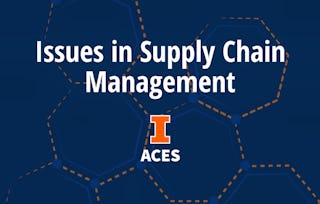The goal of this course is to understand the challenges and opportunities of agribusiness nowadays. From farms to retailers, from input providers to traders, all the diverse players of this value chain interact a complex business environment in which nature, policy, technology and management strategies have to be considered to overcome future challenges and seize upcoming opportunities.

Challenges of Agribusiness Management
Seize the savings! Get 40% off 3 months of Coursera Plus and full access to thousands of courses.

Challenges of Agribusiness Management

Instructor: Vitaliano Fiorillo
18,764 already enrolled
Included with
279 reviews
Details to know

Add to your LinkedIn profile
5 assignments
See how employees at top companies are mastering in-demand skills

There are 5 modules in this course
Instructor

Offered by
Explore more from Entrepreneurship
 Status: Preview
Status: PreviewBanco Interamericano de Desarrollo
 Status: Free Trial
Status: Free TrialUniversity of Illinois Urbana-Champaign
 Status: Preview
Status: PreviewUniversità Bocconi
 Status: Free Trial
Status: Free TrialUniversity of Illinois Urbana-Champaign
Why people choose Coursera for their career

Felipe M.

Jennifer J.

Larry W.

Chaitanya A.
Learner reviews
- 5 stars
82.14%
- 4 stars
16.07%
- 3 stars
1.42%
- 2 stars
0%
- 1 star
0.35%
Showing 3 of 279
Reviewed on Jul 18, 2020
It was a great course...agriculture allied students or businessmans must go for it,Thanks.
Reviewed on May 5, 2020
A very interesting introductory course in Agribusiness. Highly recommended for individuals with minimal involvement in this industry.
Reviewed on Aug 18, 2021
THIS COURSE HELPED ME ALOT AS I LERANT MANY NEW THINGS FROM THIS COURSE.

Open new doors with Coursera Plus
Unlimited access to 10,000+ world-class courses, hands-on projects, and job-ready certificate programs - all included in your subscription
Advance your career with an online degree
Earn a degree from world-class universities - 100% online
Join over 3,400 global companies that choose Coursera for Business
Upskill your employees to excel in the digital economy

